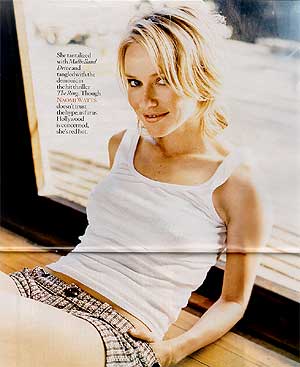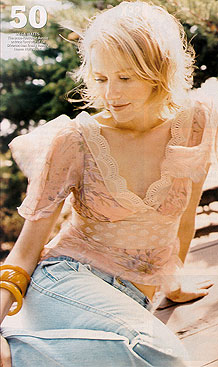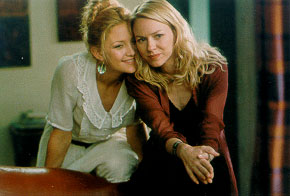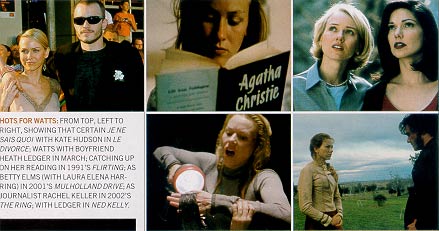

  |
She tantalized with Mulholland Drive and tangled with the demonic in the hit thriller The Ring. Though Naomi Watts doesn't trust the hype, as far as Hollywood is concerned, she's red hot.
 Naomi Watts hides in plain sight. Meet her in a hotel lobby, and she's found in the farthest private corner, behind a defensible perimeter of coffee table and leather armchairs, somewhat swallowed up on a sizable couch. Attractive? Without a doubt. Hers has to be the best chin in cinema since Julie Christie's. Working it? Not for a second. She wears faded jeans (okay, they could have been spray-painted on), a high-collared white shirt, and a scarf that's nestled around her neck under a fitted jacket. Placed demurely next to her are the kind of cigarettes they sell in certain health food stores, and she's got a water ready to go for her visitor. As she rises to shake hands, she's got a disciplined, friendly composure that says, let's do business. The eyes are guarded but alive and anything but unkind. Within a minute you'll know (via a question about varying pronunciations of her name) that "my brother calls me Namee." In fact, all you guys out there who got beady-eyed when her sweater gets soaked at the end of The Ring, deal with it-the girl is sisterly.
Naomi Watts hides in plain sight. Meet her in a hotel lobby, and she's found in the farthest private corner, behind a defensible perimeter of coffee table and leather armchairs, somewhat swallowed up on a sizable couch. Attractive? Without a doubt. Hers has to be the best chin in cinema since Julie Christie's. Working it? Not for a second. She wears faded jeans (okay, they could have been spray-painted on), a high-collared white shirt, and a scarf that's nestled around her neck under a fitted jacket. Placed demurely next to her are the kind of cigarettes they sell in certain health food stores, and she's got a water ready to go for her visitor. As she rises to shake hands, she's got a disciplined, friendly composure that says, let's do business. The eyes are guarded but alive and anything but unkind. Within a minute you'll know (via a question about varying pronunciations of her name) that "my brother calls me Namee." In fact, all you guys out there who got beady-eyed when her sweater gets soaked at the end of The Ring, deal with it-the girl is sisterly.
Not that she's a girl anymore. Watts, who's 34, endured ten years of maddeningly middling success before David Lynch's Mulholland Drive made her and on screen partner Laura Elena Harring sensual icons. Next up was 2002's The Ring, and it would be easy to underrate the Kim Novak turn she gave in illustrating the shock and awe of the horror tale's weirder twists, but its $129 million domestic take speaks for itself. Since then she's been the model of efficiency, cranking out what promise to be fine performances in smaller projects such as the darkly comic Plots With a View (opposite Christopher Walken) and Alejandro Gonzalez Inarritu's edgy 21 Grams (opposite Sean Penn).
We may have to wait awhile to see Watts as the anguished love interest to (yes, we're getting to that) Heath Ledger's infamous Aussie outlaw in Ned Kelly, but this month brings her to a goodly number of screens as an unhappy divorcee in James Ivory's adaptation of the Diane Johnson novel Le Divorce. Ivory found her the soul of preparedness and professionalism. "She reminds me of a line I like from a Jean Rhys novel," he says. "`She will row her own little boat.'"
Inarritu was delighted to find how accomplished Watts was after her years of working in relative obscurity: "She's like a good wine-so good that you have to put the bottle away; then after 10 or 15 years, you open it and it's the best." He knew she'd be a hard worker after meeting her on the set of The Ring on a day she'd spent soaking in a dank well. On 21 Grams, Inarritu tested her with a chilly wind and dozens of takes as she fiercely played a scene with Penn. She worked, off camera, "until she completely lost her voice," says Inarritu, yet, "she didn't give a damn. She's not a 'star' like that. She'll sit there afterwards and make you laugh."
"That's an Australian thing," says Watts. "We're not afraid to work hard." Another Aussie trait is Watts's avoidance of actorish chatter and cant. "I was having a conversation with [Ned Kelly costar] Geoffrey Rush about actors talking about acting, and how they should be arrested on the spot," she says. "It is what it is. All we're trying to do is tell stories and connect with the soul of that character we're taking on, so that will help other souls in the world out there connect with each other. But I mean, even that sounds pretentious."
Watts was born in the English town of Shoreham in Kent in September 1968, the daughter of Miv and Peter "Puddy" Watts. Her father was a road manager and sound engineer first for the Pretty Things, then for Pink Floyd (his maniacal laugh is heard on Dark Side of the Moon's "Speak to Me/Breathe"); he left the family when Naomi was four, and was not yet 30 when he was found dead in August of 1976. Naomi has described her mother as trying to find her feet in those days. She and older brother Ben (a successful photographer) moved about the United Kingdom with their single mom: "We lived with my grandparents in North Wales, and then we went back to London for a year, and then boarding school ... so yeah. I've never had one place that lots of people do have, that I can dream of as my home. I've never had that."
When Naomi was 14, the family decamped for Australia. Having seen her mom in a local musical, she took acting classes even as she modeled and appeared in commercials. Increasingly certain that she was destined to act, she quit her short-term job at a fashion magazine with no guarantees, and two weeks later, she was cast in the coming-of-age tale Flirting (1991) alongside Thandie Newton and best-friend-to-be Nicole Kidman. Her path was staked out-but not without some detours.
En route to a trip through Europe, she stopped in L.A., where various agents and film types encouraged her to return soon and take Hollywood by storm. Instead came a succession of incursions and retreats, and such films as Gross Misconduct, Children of the Corn IV, and the haywire comic book adaptation Tank Girl. In the latter, she and Lori Petty showed, for dramatic purposes, how not to kiss another girl, and Watts made a new friend in fellow cast member Scott Coffey. After five years of sharing the rejection and bitterness that comes with largely fruitless auditioning, Coffey shot and Watts starred in 2001's remarkable Ellie Parker, a kind of mockumentary. Watts plays an Aussie actress who, more for budgetary reasons than Method verisimilitude, drives Watts's own Honda (when she got rear-ended, Coffey brought his digital camera and they quickly did a scene about it) and basically lives Watts's life, racing to absurd readings for parts as southern belles and Brooklyn junkie-hos. They brought the film to Sundance, where festival-goers applauded its mordant wit and snapped up the promo T-shirts quoting a Brooklynese line from an Ellie audition ("I Sucked It Good").
Inarritu recalls being staggered by Watts's 180-degree flips in mood and affect (prefiguring her erotic audition with an aging ham actor in Mulholland Drive), but Ellie's cri de coeur is exactly what Watts herself was going through: "I feel like I'm waiting for my life to start," moans Ellie. "You audition and you show yourself and people don't like you."
Ah, but somebody did. In the months before she and Coffey shot their Tinseltown comedy of despair, both had been at work for David Lynch. The maverick auteur had picked Watts's photo (shot by her brother) from a stack, and cast her in what was designed to be a long-running ABC series that would evoke the revolutionary Twin Peaks. The network saw the Mulholland Drive pilot, found it too grim and oblique for prime time, and didn't pick up the series-but then a tentative offer came for funding for Lynch to turn the footage he'd shot into a feature.
Watts recalls waiting for the funds: "There was a lot of talk and excitement that trickled down to literally nothing." She and Coffey (along with Mark Pellegrino, who appears in Mulholland Drive as a kind of Harold Lloyd hit man) kept shooting digital chapters of Ellie Parker as they waited. Though she still had steady encouragement from Kidman, she had little money and few prospects. (Shortly before she went to Cannes to promote Mulholland Drive, one of the more prestigious boutique talent agencies in Hollywood turned her down flat; she's now at C.A.A.). Just weeks from arriving at stardom, "I was still living on the bones of my ass, as they say in Australia," she says. "And that rage that you saw in Ellie was still there."
 Soon enough came the call canceling the feature-Mulholland Drive was dead. But the principal actors had decided early on, Watts recalls, "we couldn't accept it. We had really bonded on the course of the show. And this was our big break. This was David Lynch. How could it be a no? And what could we do to turn it into a yes? We eventually had the courage to go up to his house and his studios where he works and lives, and read him this letter of why we needed this to go on, and just because they say no, let's not let this sit on a shelf and collect dust. Let's see that there is a life after. He shouldn't have been defined by these suits."
Soon enough came the call canceling the feature-Mulholland Drive was dead. But the principal actors had decided early on, Watts recalls, "we couldn't accept it. We had really bonded on the course of the show. And this was our big break. This was David Lynch. How could it be a no? And what could we do to turn it into a yes? We eventually had the courage to go up to his house and his studios where he works and lives, and read him this letter of why we needed this to go on, and just because they say no, let's not let this sit on a shelf and collect dust. Let's see that there is a life after. He shouldn't have been defined by these suits."
"He was slightly devastated too. He's a true artist." Watts, perhaps sensing she's betraying the Aussie reflex against speaking profundities, asks for the okay to light one of her detoxified cigarettes. The next declaration feels autobiographical as it comes out with the first stream of smoke: "And artists are not very good with handling judgment, you know. He's a sensitive person. He could see the energy and the passion that we all had for the project, and it was there for him too."
Luckily, a European contingent led by Canal Plus financed the picture, which cost $15 million and had an impact (Lynch shared the Best Director prize at Cannes with Joel Coen) well out of proportion to its $7 million box office take. Watts's compelling dual portrait-veering from the naive Betty, who turns up in L.A. to start an acting career, to the emotionally and physically trashed Diane, who's heartbroken over a lesbian love affair-drew rafts of warm reviews. Early on in the film's promotion, Watts was fairly straightforward in stating her belief that the tortured Diane is the "reality-based" character, whose unrequited love and sadness bordering on dementia has led her to create "the wish, the dream, the fantasy, the projection" of Betty.
Since then, as the secretive Lynch has gone from being her director to being her mentor and friend, she's much less revealing. As recently as March, she and Coffey were making episodes for Lynch's website sitcom, "Rabbits," and she's kept to the credo she developed when he asked her to explore woman-on-woman sexuality, nudity, and scenes of overwhelming autoerotic despair: "I just believe in David and trust him and worship him; he gets incredible performances out of people, and so I was putty in his hands. Sometimes I was going against my instincts, but I thought, he knows what he's doing. Trust him."
 When the offer came for The Ring-the script unspooled on the pre-historic fax machine in her mother's country home-"I was nervous about doing a big studio film, right after Mulholland Drive had garnered a lot of critical attention. I thought, 'Are people going to give me a hard time?' The second time out the door is judged more harshly. But it tells you it's going to be a different film in the first ten minutes with the two young girls, then bang, it goes another direction-really smart, with concise psychological and spiritual elements. And what a great role."
When the offer came for The Ring-the script unspooled on the pre-historic fax machine in her mother's country home-"I was nervous about doing a big studio film, right after Mulholland Drive had garnered a lot of critical attention. I thought, 'Are people going to give me a hard time?' The second time out the door is judged more harshly. But it tells you it's going to be a different film in the first ten minutes with the two young girls, then bang, it goes another direction-really smart, with concise psychological and spiritual elements. And what a great role."
Producer Walter Parkes gives credit to Watts: "We cast for the character and not for the marquee, because we needed an emotionally legitimate actress for the role." It's another bravura Watts arc, as she goes from hard-bitten investigative reporter ("You touch my column, and I'm coming down there and poking your eye out with that little red pencil you like so much") to desperately fearful mother.
By the time The Ring finished its robust box office run, Watts was a bankable star. Characteristically, she began a series of offbeat films. When she signed on for just a couple weeks' work in Ned Kelly, Coffey was betting that she and Ledger would have true chemistry: "I would call her and go, `I'm checking in,' and she goes, `Oh, God, no, no, no.' And I would say, `Come on,' and then she was like, `Well, maybe. ..'"
Watts had arrived on the set an hour outside of Melbourne exhausted from making three films end-to-end, and she found herself once more postponing her real emotional life. "We all struggle with a bit of loneliness in this business," she says, "because you travel and you pick up and you leave all the time. I had broken up with a boyfriend about eight months before."
One Friday afternoon, the actress found herself (as Julia Cook, squatter's wife and mother of two) enacting an intense leave-taking with 24-year-old Ledger's title character. By the time Kelly has realized Julia must turn him aside, Ledger's nuanced acting had won more than her admiration: "He got on his horse and said,'Goodbye, and thank you, now I understand,' and galloped off. And that was a special moment."
The duo was photographed in a Melbourne club that weekend, and shot their love scene on a closed set on Monday. Soon afterward, they tripped off to Bali on a break with friends (they left Bali two weeks before the infamous nightclub bombing of October 2002), and are now living the kind of itinerant romance actors must. Watts barely notices their age gap, because "he's an old soul, that one. He's a very passionate guy. He's always doing something, even if he's sitting still; he's got a million things going on in his mind. Bing, bing, bing, bing, you know." She's told about a reporter's visit to Ledger's house for an interview that interrupted the project he was doing to loud Aussie rock-the painting of his living room moldings a very bright orange. "Yeah, he's got some pretty vivid colors. But as my interior-designer mom says, 'No color, no heart.'"
Coming up in Watts's bing-bing series of jobs is Anymore, a character drama (from two Andre Dubus short stories) that she's coproducing in Vancouver with Mark Ruffalo and Laura Dern. She's hoping her portrayal of Roxy in Le Divorce (which meant a welcome two months living in Paris in the spring of 2002) lives up to Ivory's take on the complicated romantic tangle: "He told it without any judgment, just people and life."
It would be nice if Watts had time for that sort of thing, no? She's pensive for a moment. "There are people out there who work just too much, and I'm feeling a little guilty about myself lately. I'm working too hard, and there's a danger in that." Watts inclines her head, thinking it through. "Unfortunately, I haven't trusted things enough, because-well, you can see my backstory. And I'm now coming into a comfort zone of being ready to own it and trust it, and going, `Okay, don't be afraid to say no.' Because otherwise I'm going to come to a place where you are like a robot, jumping from one thing to another. But the point is, like I say, to connect with the other souls out there. The only way to do that is to live a life and connect with human beings on an everyday basis. Go to the dry cleaners, have a fight with them. Stand in line for the bank teller."
Watts, an expert physical actor, delivers one of the afternoon's rare gestures-a feathering of her hand that acknowledges how prosaic such crises may sound to real working stiffs. "Those little things that create chaos and interaction in your life, that's just normalcy," she says. "If you don't give yourself time to do those things, how can you play these characters? Because your life becomes about life on the set, and you end up imitating another performance. So you have to be careful."
Watts's next appointment stands nearby. This, in light of the words she's just spoken, draws an ironic grin out of her. After her gracious farewell, if one turns for a look, she can be seen, resettling her spot on the couch, turning her full attention to what's next-Naomi Watts, rowing her own little boat.
Copyright 2003 Hachette Filipacchi Media U.S., Inc.
Back to the Mulholland Drive articles page.